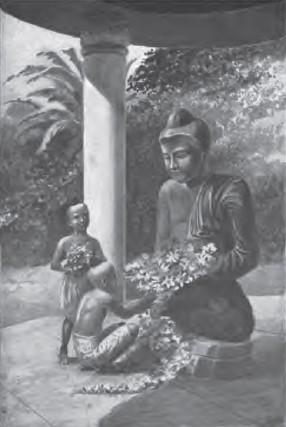| Web
and Book design,
Copyright, Kellscraft Studio 1999-2009 (Return to Web Text-ures) |
 (HOME)
|
CHAPTER V.
NEW YEAR'S IT was the 27th of March, but to Chin and his sister it was the first day of a new year. They woke up happy and smiling, for they would have much fun for three whole days. It is all very well for some people to be satisfied with a festival which lasts only twelve hours, but it is not so with the Siamese. They think they cannot do justice to such a joyful time unless they frolic and feast three times as long as that, at least. On the first day the children must go to the temple and carry offerings. This duty should certainly not be forgotten. But before they left home that morning they helped their mother give dishes of rice to the yellow-robed priests who rowed slowly down the river as the sun was rising. These priests in their long yellow gowns looked alike. Each one held before him a begging-bowl. He did not ask for food or money. It was the duty of the people to feed him and give what was needed to keep him from want. This was what Chin and those of his country believed. And so, when each night was over, the priests left their cells and entered their boats. They passed along the river and through the canals. Some people gave to one, and some to another; some gave money, and some, food. But each one thought as he gave, "I am gaining merit by this deed of kindness." And he felt better for doing so. When the priests had passed along, Chin and his sister began to think of their friends. They had presents of sweetmeats for them. They had saved all their spare coins for many days to buy them. These sweetmeats looked very tempting as they divided them up and placed them in tiny baskets they had woven out of grasses. Some of them were made of sugar and cocoanut. Others were rich with glutinous rice and peanuts. Their friends would be delighted with their gifts. Before the day was over, Chin and Chie Lo had received many presents themselves, for the poorest people in the country manage to remember the New Year's festival. The day was noisier than usual. The children laughed and shouted more than Siamese children commonly do. They danced and they sang. They went into the country and gathered flowers. They made wreaths and garlands. They carried some of their flowers to the statue of Buddha and placed them in the open palms of their saint. They played tricks on each other. Chin and Chie Lo were both caught by their playmates before the day was over and their faces blackened, and then they were shoved into the river. But they took the joke with perfect good nature, and laughed over it as merrily as their friends. The best sport of the day was with their dear old grandmother. As she sat on the platform by the water's edge, Chin came up suddenly and dashed water all over her. After that, he sprinkled her with perfume and a sweet-smelling powder. But this was not all, for he ran into the house and brought her out a new waist-cloth and a scarf to throw over her old shoulders. At the same time Chie Lo pressed two silver coins into her hand, and shouted with delight at the smile on the dear grandmother's face. Without doubt the New Year's festival was very merry. Best of all, the children were allowed to do just as they pleased for the three long, happy days. It is no wonder they were sorry when it was over. "It is even better than the Swing Days," Chie Lo said to her brother, as they settled themselves for a good night's rest. "Yes, I think so, too, yet we have a great deal of fun then," answered her brother, sleepily. Girls never take part in the exercises of the Swing Days, but Chin had been training for two or three years to try his skill when he should be a little older. A part of the city is set aside for the entertainment, and it is there that the swings are set up on high poles. A short distance away stands another pole marked with a waving banner. Just below this banner hangs a purse filled with gold. Each person who enters the swing is allowed to work it back and forth till he brings himself near the precious purse. He has one chance given him to reach out and seize it in his mouth. If he succeeds, it is his to keep, and he goes down to the ground on a rope ladder by the side of the pole, while the bystanders greet him with shouts and cheers. If he fails, however, he is obliged to jump from the swing and slide down to the ground on the pole, while every one joins in a laugh at his awkwardness. On Swing Days there are many processions through the streets. Banners and flags are waving everywhere, no work is done, and every one is gaily dressed and full of joy. |
